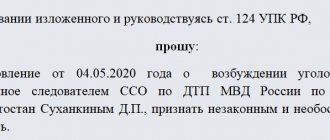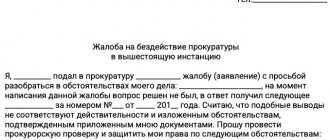Grounds for claims
The most common reasons for filing a complaint against an investigator include:
- Refusal to initiate a criminal case.
- Termination of criminal prosecution without valid reasons.
- Violation of the rules for conducting investigative actions.
- Insulting the honor and dignity of a citizen.
- Violations of the order of detention of citizens.
- Disclosure of investigation information.
- Refusal to consider the application.
- Distortion of facts or incorrect interpretation of events.
You can also complain about the investigator if he deliberately delays the investigation process.
Who can complain
Any participant in the criminal process from the prosecution, defense, as well as a person who contributes to justice can appeal the actions of the investigator, including:
- Officials of the prosecutor's office, investigative committee, court.
- The victim, the accuser, the plaintiff or their legal representatives.
- Accused, suspect, defendant or defense attorney.
- Legal representatives of minor children who participate in the process.
- Witnesses, attesting witnesses.
- Experts, translators.
If a citizen has no relation to the criminal process under consideration, he has no grounds for appealing the actions of an employee of the investigative bodies.
Compilation rules
The current legislation does not provide for strict requirements for the form and content of a complaint against an investigator. It is enough for the applicant to adhere to the general rules of office work:
- Present information concisely.
- Avoid using expressive language.
- Pay sufficient attention to the substantiation of claims; only appeals with irrefutable evidence will be considered in favor of the applicant.
- If the investigator made decisions that violate your rights, they should be attached to the application.
- It will be necessary to indicate which legal norm should be applied to the official.
Legal advice! The rights and responsibilities of the investigator are enshrined in the Code of Criminal Procedure of the Russian Federation, therefore, in the event of violations on the part of the executive, one must refer to this regulatory document.
The right of citizens to appeal the actions of the investigator is enshrined in Art. 123 Code of Criminal Procedure of the Russian Federation.
What to write?
A complaint to the prosecutor's office about the inaction of an internal affairs investigator must contain:
- name of the recipient of the document, address;
- information about the applicant;
- data of the investigator or inquiry officer, whose inaction is subject to appeal, his place of work, full name;
- the essence of the issue, that is, a brief description of the inaction;
- references to articles of regulations that, in the opinion of the applicant, were violated (you can refer to Article 123 of the Code of Criminal Procedure, which allows you to appeal against the inaction of an official);
- the requirements put forward by the applicant;
- list of attached documents;
- date, signature and its transcript of the originator of the appeal.
If a lawyer files a complaint about the investigator’s inaction, his data is also indicated, including a document confirming his authority (power of attorney), which is indicated in the appendices and goes as an addition to the complaint.
The text of the document should be written only in business style. There should be no unnecessary reasoning, insults or emotional statements.
To the head of the investigative body
The document must be drawn up in writing and submitted personally to the secretary or sent by mail. In the first case, the document will be assigned a registration number, so you need to prepare a second copy of the application in advance, which will remain in your hands, indicating the date of receipt and the journal entry number. When sending a complaint by mail, it should be sent by a certified letter with acknowledgment of receipt.
Instead of the applicant, his legal representative has the right to submit a document if he has a notarized power of attorney.
The application can be written in free form, but there are mandatory components, including:
- Name of the organization and/or full name of the addressee.
- Full name, address and telephone number of the applicant.
- The essence of the claims with a detailed description of the actions or inactions of the investigator that resulted in a violation of your rights.
- Date and signature.
If necessary, you can attach documents and materials on the case or copies thereof to the application.
According to Article 124 of the Code of Criminal Procedure of the Russian Federation, the head of the investigative body considers the complaint within 3 days from the date of its receipt. Based on the results of the consideration, a decision is made to fully, partially satisfy the complaint or to refuse to consider it.
In exceptional cases, the period for consideration of such applications may be extended to 10 days, but the applicant must be notified of this. Such situations are usually associated with the need to request additional materials on the case.
The applicant must be immediately notified of the decision. You can appeal a decision made by the head of the investigative body by appealing to a higher investigative body.
Review procedure
The procedure for filing and considering a complaint to the prosecutor's office regarding the investigator's inaction is regulated by Article 124 of the Code of Criminal Procedure. This type of appeal is dealt with by an official working in the department for supervision of the work of investigative authorities.
The complaint must be considered within 3 days. If the stated circumstances require additional investigation, the period may be extended to 10 days. The applicant must be notified of the extension of the deadline.
After consideration of the appeal, three types of decisions can be made:
- refusal;
- full satisfaction of requirements;
- partial satisfaction of requirements.
Not only the applicant, but also the investigator has the right to appeal the decision.
Central office of the Investigative Committee
You can contact the central office of the Investigative Committee in one of the following ways:
- Make an appointment with the head of the main department of the Investigative Committee.
- Submit a claim in person to the reception committee at the address: Moscow, st. 1st Frunzenskaya, 3a.
- Send the application by a valuable letter with notification to the address for written requests from citizens: 105005, Moscow, Tekhnicheskiy Lane, 2.
There are also several telephone lines for citizens to contact:
- 8-800-100-12-60 – using this number you can report unlawful actions of employees of the Investigative Committee, including manifestations of corruption. Calls are free from anywhere in Russia, the line operates 24 hours a day.
- 8-800-100-12-70 – telephone number for contacting the Chairman. The direct line is open every first and third Wednesday of the month from 14.00 to 19.00.
You can contact the Investigative Committee using the Internet reception at https://sledcom.ru/#reception. When writing an appeal, you should take into account that appeals that contain:
- obscene language;
- text written in Latin or capital letters;
- incomplete address of the applicant;
- a statement without specifying specific complaints and suggestions.
If the heads of lower investigative bodies did not make a decision on citizens’ appeals, in accordance with Order of the Investigative Committee at the Prosecutor’s Office of the Russian Federation dated September 19, 2007 No. 17, the complaint is sent to the appropriate body within 7 days from the date of registration. The applicant must be notified of the redirection of the complaint.
Complaints submitted through the Internet reception are processed in accordance with the Federal Law “On the procedure for considering appeals from citizens of the Russian Federation” dated 05/02/06.
In accordance with the Federal Law "On the Prosecutor's Office of the Russian Federation", supervision of investigative bodies is carried out by the prosecutor. This means that complaints against a representative of the investigative bodies can be filed with the prosecutor’s office, but only after there has been no response to the appeal from the head of the investigative agency at the place of residence. However, you can file a complaint with the prosecutor’s office and at the same time contact the head of the investigative department.
How to file a complaint against an investigator online? Procedure for 2022
To file a complaint with the Investigative Committee of the Russian Federation, you need to go to the “Internet reception” section on the official website of the department and fill out a simple application form:
Important! Your online complaint will not be considered if:
- It contains obscene language and/or offensive language;
- It is written in a foreign language (or in Russian, but using the Latin alphabet);
- The text of the complaint is not readable (for example, it is not divided into sentences or does not contain punctuation marks);
- The text of the complaint is written entirely in capital letters;
- You provided an incomplete or incorrect postal address;
- Your appeal does not contain specific statements, complaints or suggestions.
Note! We talked in detail about how to properly contact the prosecutor's office via the Internet in the article How to file a complaint with the prosecutor's office online? Procedure for 2019.
Prosecutor's office
A complaint about the actions or inactions of the investigator to the prosecutor's office must contain the following information:
- The name of the structural unit of the prosecutor's office.
- Applicant's full name, contact details.
- Description of the actions/inactions of the investigator that you want to appeal.
- Request to recognize the actions of an authorized person as illegal.
- Date and signature.
Complaints against the investigator to the prosecutor's office can be found here.
The appeal must be sent to the prosecutor's office at the place where the preliminary investigation was conducted.
The application must be submitted in writing in one of the following ways:
- personally into the hands of the secretary.
- by mail.
Consideration of the application is carried out within up to 3 (in rare cases up to 10) days. The prosecutor's office does not accept repeated complaints, therefore, if the decision made does not suit you, you should contact higher departments.
Complaint against an investigator: rules for drafting in 2019
It must be remembered that your complaint about the decision, actions or inaction of an employee of the Investigative Committee is, first of all, an official document. Therefore, when drawing up such a complaint, we recommend adhering to the basic rules of business correspondence:
Firstly, carefully select your vocabulary, avoid inaccuracies and ambiguous phrases, as well as excessive use of abbreviations;
Secondly, divide your written appeal into meaningful paragraphs so that it is not cumbersome and difficult to understand;
Third, be sure to include your name and mailing or email address to respond to the complaint. An anonymous request is 100% likely to be left without consideration.
The text of the complaint against the investigator must include the following information:
- Information about the addressee of the complaint (in 2022, a complaint against the investigator can be filed with the prosecutor’s office or the head of the investigative body);
- Last name, first name and patronymic of the applicant;
- Contact details of the applicant (email or postal address to which the response to the complaint should be sent, telephone number for communication, etc.);
- Full name of the investigator whose decision, actions or inactions you want to appeal;
- Place of service of the specified investigator;
- Description of the events that gave rise to the complaint (for example, failure to take necessary measures or suspension of the criminal case);
- The applicant’s requirements (for example, to conduct an investigation into the facts specified in the complaint);
- List of documents attached to the complaint (if necessary);
- Date of filing the complaint.
complaints against the investigator (version current for 2022)
Note! If you have questions or encounter any difficulties when preparing a complaint against the decision, actions or inaction of an employee of the Investigative Committee in 2022, you can always seek free legal advice from the specialists of the CenterSoveta portal. The average waiting time for a response from a lawyer is 15 minutes.
Court
Such claims are considered in open court. During the hearing of the case, the plaintiff or his legal representative, as well as the investigator whose actions are being appealed, must be present in the courtroom.
The complaint must be sent to the district court, which is in charge of the preliminary investigation. In cases where there is more than one district court, the claim should be filed with the court at the location of the investigative body, in accordance with the Resolution of the Supreme Court.
A lawsuit can be filed in one of the following ways:
- Submit in person to the court office.
- Send by certified letter with return receipt requested by mail.
- Submit through your legal representative.
A properly completed lawsuit must contain the following information:
- The name of the court to which the claim is filed.
- Full name, address and contact telephone number of the plaintiff.
- Full name of the representative, if the application is submitted through him.
- A statement of the circumstances under which your rights were violated. Justification by evidence.
- Specifying requirements.
- Date and signature.
By a court decision, the actions of an authorized person may be recognized as unlawful, and the claim may be fully or partially satisfied. Also, the judicial authority, after considering the case, may refuse to satisfy the applicant’s claim.
What decisions and actions of the investigator and interrogating officer can be appealed to the court?
Lawyer Antonov A.P.
The Code of Criminal Procedure of the Russian Federation not only guarantees every citizen access to justice, but also provides for measures that ensure and protect this right. Such measures include the possibility of judicial appeal of the actions of the investigator and interrogating officer, provided for in Article 125 of the Code of Criminal Procedure of the Russian Federation. However, despite the apparent simplicity of this rule, significant difficulties arise in its application. And the general practice of applying this norm is not entirely successful. Thus, in 2018, out of 121,881 complaints, the courts satisfied only 5,416 (4.4%), and rejected 22,850 complaints (18.7%). The majority of complaints - 93,615 (76.8%) - were returned to the applicants, which can be equated to refusals of satisfaction. In the first half of 2022, these figures were respectively: 57,798 complaints, 2,538 (4.4%), 10,669 (18.5%) and 43,169 (75%).
Such a high percentage of complaints returned to applicants is due to the fact that Article 125 of the Code of Criminal Procedure of the Russian Federation is not worked out in sufficient detail, and the gaps are not always interpreted in favor of the applicant. However, when deciding on the application of this norm, there is a fairly extensive judicial practice, which partially resolves the issue of the lacunae of Article 125 of the Code of Criminal Procedure of the Russian Federation. Thus, judicial practice has formulated a range of issues that are subject to consideration in this order, in addition to those provided for by law: on the refusal to recognize a victim, on making payments to a rehabilitated person, on the refusal to appoint a defense lawyer, on the suspension of the preliminary investigation, on the refusal to accept a report of a crime and etc.
Also, by virtue of the provisions of Article 125 of the Code of Criminal Procedure of the Russian Federation, the refusal to initiate a criminal case can be appealed. On this issue, the appeal ruling of the Stavropol Regional Court dated April 12, 2019 based on material No. 1740/2019K is quite interesting. The applicant filed a complaint with the district court, but it was returned for three reasons: the subject of the appeal is missing, the applicant’s request is not clear, and there is no decision being appealed. An appeal was filed against the court’s refusal, and the appellate court came to the conclusion that before refusing to accept the complaint, the court should have requested materials on the appealed criminal case. In addition, a copy of the decision to refuse to initiate criminal proceedings was attached to the complaint. Regarding the ambiguity of the request, the court indicated that they could be clarified at the court hearing.
Another example, on the contrary, concerns the illegal initiation of a criminal case under Article 173.1 of the Criminal Code of the Russian Federation. As the applicant pointed out, this decision was made only on the basis of the crime report and the report of the operational officer. At the same time, the necessary actions aimed at establishing a crime were not carried out. There were no surveys of citizens with registered legal entities, requests for documents, searches, etc. As the court of appeal indicated, to initiate a criminal case, a report of a crime and a report from an operational officer are not enough (appeal resolution of the Supreme Court of the Republic of Dagestan dated April 10, 2018 to material No. 458/2018 K).
Another interesting question is what actions and decisions of investigators and interrogators are not subject to appeal. In this matter, it is necessary to rely on the general rule of Article 125 of the Code of Criminal Procedure of the Russian Federation: only those actions and decisions that impede citizens’ access to justice are subject to appeal, for example, the investigator’s refusal to grant a visit to a relative (appeal resolution of the Krasnodar Regional Court dated March 12, 2019, based on material No. 22-1188/19) or actions and decisions taken in the process of carrying out operational investigative activities and conducting operational investigations (appeal resolution of the Ryazan Regional Court dated 04/11/2019 based on material No. 22K-196/2019).
A complaint in accordance with Article 125 of the Code of Criminal Procedure of the Russian Federation can be filed even after a verdict is passed, for example, when appealing the prosecutor’s refusal to resume proceedings in the case due to new circumstances (clause 18 of the Resolution of the Plenum of the Supreme Court of the Russian Federation dated February 10, 2009 No. 1 “On the practice of consideration of complaints by courts in accordance with Article 125 of the Criminal Procedure Code of the Russian Federation”).
Sincerely, lawyer Anatoly Antonov, managing partner of the law firm Antonov and Partners.
Still have questions for your lawyer? Ask them right now here, or call us by phone in Moscow +7 (499) 288-34-32 or in Samara +7 (846) 212-99-71 (24 hours a day), or come to our office for a consultation (by pre-registration)!
The legislative framework
When drawing up a complaint against the actions or inactions of the investigator, you must be guided by the following legislative acts:
- “Criminal Procedure Code of the Russian Federation” dated December 18, 2001 N 174-FZ (as amended on July 1, 2017).
- Order of the Investigative Committee at the Prosecutor's Office of the Russian Federation dated September 19, 2007 N 17 (as amended on 04/08/2008) “On the implementation of the Instructions on the procedure for considering applications and receiving citizens in the system of the Investigative Committee at the Prosecutor's Office of the Russian Federation.”
- Federal Law “On the procedure for considering appeals from citizens of the Russian Federation” dated May 2, 2006 N 59.
- Federal Law “On the Prosecutor's Office of the Russian Federation” of January 17, 1992 N 2202-1.








